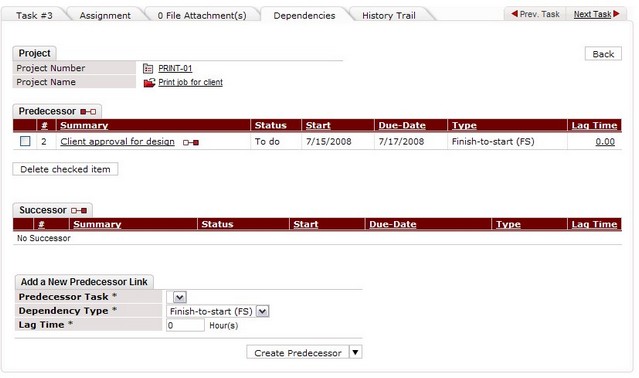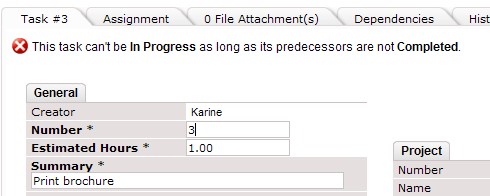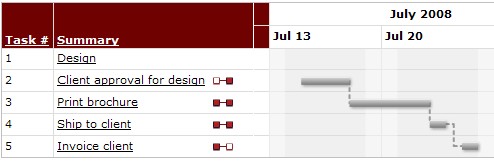The right tools
Have you ever tried to hammer a nail with the handle of a screwdriver? It doesn't take long to realize it's not going to work. It takes even less time to understand that the time you invest in buying a hammer will be gained many times over when you need to hammer nails.
Having the right tools to do a job is crucial, regardless of the job you're doing.
When managing projects, using an Excel sheet or a Word document or even the very simple "emailing a task list to everyone" will only make your project difficult, or even impossible to manage. Manual project management forces the project manager to remember a lot of things that software solutions can automate easily.
For example, if you're doing manual project management, you'll need to remember to remind you team when tasks are getting close to their due dates. Project management systems like AceProject will do that automatically. You'll also need to follow up with your team if their tasks are late – another task that can be automated […]
The best brands are not brands at all
Websystems is located in Quebec City. This year, it's the 400th anniversary of the city's foundation. While technically, Quebec City is not the oldest city in North America, it is the only one that is still there, in its original location.
To celebrate the event, we've been having a big party since the summer began. Yesterday, we had one of the biggest events so far: the event organizers invited Paul McCartney (yes, THE Paul McCartney). The show was free. You can imagine the crowd that showed up to see this living legend. People slept in front of the gates before the park opened. about 1 person out of 3 that lives in Quebec City went to the event.
That's how much pull Paul McCartney has. How powerful his brand is.
What I found interesting about him is that he seems to have built his brand on just being himself. People like him because he is a legend in the musical realm. But he's likeable because he seems to be such a nice […]
When Murphy takes over
Murphy is taking over my work day: my laptop has been turned into a brick by the very application designed to save it from becoming one, the Restore program.
My week started looking bright. I had been having problems with my laptop for a while, and I thought restoring it to factory defaults and starting over would fix a lot of issues. Conveniently, my laptop has just the application to do this, in a few clicks. So I make sure to back up all my data, get all my applications' install files and take note of my settings to make sure I could reinstall my work environment in a speedy manner.
As I arrived at work this morning, I got ready to restore my laptop. And Murphy took over.
At first it felt like my day would be wasted.
But wait! Some good can come out of this, I promise
It turns out that, like many failures we have to deal with, this laptop issue has a silver lining: My laptop's hard drive is now being entirely checked and […]
It’s too complicated: educate the user or change the product?
When testing a new product interface, we at Websystems have our ears out for comments that sound like "it's complicated" or "I can't figure out how to do this."
For us, when these comments are made repeatedly about a feature or a page in AceProject, it means we've made a mistake in our design. While we work hard on getting good, usable documentation for AceProject, our goal is that our users don't need to consult it when building their projects, updating their tasks, and going about their daily activities in the system. We think is filling out a time sheet should be self-evident.
Moreover, even if it's really difficult for the developer, he will work on making that feature simple and easy for the user once. The user, on the other hand, will use the feature many, many times. So it's more profitable to invest development time once, since it will save a lot of user time in the long run.
Task dependencies
Most projects require that some tasks are accomplished in a specific order. For example, in a publicity project, the marcomm firm will want the client to approve the design before it goes to press. When the client, the representative and the printer are not in the same city, the risk of the file going to print too early can get pretty high. Ask any printing company how pleasant that is.
If you want to make sure that your client approves the design before it is sent to print, set up your client project in AceProject, and link the client approval task to the printing task with a dependency:

Once there is a dependency, you won't be able to open a task, unless the previous task is completed:

And in the Gantt chart, it's easy to see how the tasks are linked:

However, what I like most about task dependencies is how task dates are […]
Back from India
Last year, we were contact by our local university to participate in a business development mission to India. We would sponsor a graduate student of marketing, who would go to India on our behalf. We could set any business development goals we wanted. The mission was presented as a good way to learn about this huge market and how we could adapt AceProject to increase sales in India.
We figured this was a great opportunity. After all, India is poised to become one of the biggest economies on the planet. Its growth has been above 6% every year in the last decade. This is a market where we definitely want to be.
We would learn more about India. In fact, we thought, why not actually hire someone in India to do our customer service and sales? We knew one reason why our sales are not spectacular in Asia is the time zone difference.
Hence, we tasked our representative for the mission to not meet with a project management association, explore the feasibility of hiring someone in India […]
The power or “I don’t know”
As a project manager, we are the team's leader. It's easy to feel that we should have all the answers.
Leadership is not knowing everything.
Leadership is knowing where to find the knowledge and the answers. It's OK to say "I don't know." It's OK to ask for help from your team. After all, the project team is there to work together with the project manager.
As a leader, admitting that you don't know will make you look more human in the eyes of your team. It will also create an opening for someone on the team to show their value by answering the question.
Saying "I don't know" creates opportunity for creativity. If I don't know how to build an interface screen, it means I have to learn how to do it, to find inspiration from good examples of interface design. This is a great opportunity to work with my team and build something new and fresh.
Not knowing can be leveraged to your advantage.
Upgrade VS clean install
The opinion one will form of a product will be different along the life of the product. Let's take the example of software.
When you do the first installation, everything is fresh and it feels like the system work perfectly. Once you upgrade (to a new version, for example), you will see the full measure of the product's quality. When upgrading to a new version, the process should be smooth. I am not talking here about an absence of bugs in the system. What I mean is that the system should be able to take the previous version's data (configuration, preferences, etc), and fit them in the new system.
If that process is not smooth – as happened with one of the tools we use at Websystems – you loose the trust of your customers, and they will prefer to stick with the version they have, even if the upgrade brings more usability. If the hassle of the upgrade is too much, there will be an impact on subsequent sales to existing customers.
Honesty: if the shoe won’t fit, why sell it?
Sometimes we are so bent on closing a sale that we are tempted to ignore the needs to the clients and push our product. We are focused on the short term (closing the sale), instead of the much more profitable long-term (having a happy client).
AceProject is a great project management system. Unfortunately, it does not contain any feature ever required by a project manager. For example: AceProject does not include any financial data like hourly rates and cost-tracking. While we do plan to include a cost-tracking module in the mid-term, the current version has no dollar signs in it.
Hence, when a prospective client emails us with a requirement to track costs, we have two choices: sell AceProject with a vague promise of implementing those features at some point, or tell the client upfront that AceProject does not fulfill his requirements for cost tracking. We prefer the second option.
Who knows what the future has in store for us? The fact that we plan to implement a feature today does not mean it will be implement […]
Urgent VS important
In project management, it's easy to confuse urgent with important. When something is urgent, it's usually assumed it must be important. No true. The fact that a specific report is needed in five minutes for the board meeting does not necessarily need it's important. Maybe the meeting can go on without the report.
Since the word urgent makes everyone run a little faster, its vulnerability to abuse – as we discussed already – requires more scrutiny.
When dealing with an emergency, one should answer the following questions:
- Can the project work around it?
- Can the project be completed without it?
If the task can be late and not affect other tasks immediately, then it is not urgent, even though it could be important. Also, is the project can live without that task being completed at all, it's not even important. However, if the task both stops the project dead in its tracks and is required for completion, then it's both urgent and important.
Better get right to it, then 🙂